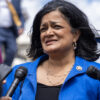This op-ed is part of a series exploring the writings and jurisprudence of Judge Amy Coney Barrett, the president’s nominee for the U.S. Supreme Court.
Now that President Donald Trump has nominated 7th Circuit Judge Amy Coney Barrett to the Supreme Court, the Senate must assess her qualifications, including her legal experience and judicial philosophy.
Want better access to more videos from The Daily Signal? Subscribe to our YouTube channel! Just go here: youtube.com/dailysignal
Although experience can be summarized on a resume, a Supreme Court nominee’s understanding of the power and proper role of judges can be harder to describe.
Justice Clarence Thomas described the “modest” judicial task as interpreting and applying written law to the facts of particular cases. Barrett’s judicial philosophy is how she approaches that task in all of her cases.
Here, we look for clues in her cases and scholarship involving the First Amendment.
The Senate should consider a judicial nominee’s record on its own merits, and in the proper context. Though common, evaluating judicial decisions by which party to a case wins or loses, or by the political interests that might be furthered, is fundamentally misguided.
As Justice Ruth Bader Ginsburg said during her Senate confirmation hearing in 1993, “Judges in our system are bound to decide concrete cases, not abstract issues.”
Although a few issues seem to attract most media or political attention, judging is about the process one uses to reach results, not the results themselves. Americans, therefore, need to know the process that a judicial nominee will use in all of her cases, whatever the issue and whoever the parties.
Most cases in the U.S. Court of Appeals are first considered by a panel of three judges. Their judgment answers the legal questions posed by a case and, most of the time, a written opinion explains that judgment. Some of these written opinions, called per curiam opinion, are not attributed to a particular judge, but rather to all of the judges as a whole.
More typically, one judge writes the majority opinion; the other two judges on the panel may join that opinion or write their own, explaining why they agree or disagree.
Barrett has written roughly 100 opinions that may provide more insight than the opinions she joined, although information about someone’s judicial philosophy may be gleaned from those too.
These opinions must be read with the understanding that three-judge appeals court panels are bound by precedents of both the circuit and the Supreme Court.
With that in mind, Barrett herself made a strong statement about her judicial philosophy during the Rose Garden ceremony where Trump announced her nomination.
She said: “I clerked for Justice [Antonin] Scalia more than 20 years ago, but the lessons I learned still resonate. His judicial philosophy is mine too: A judge must apply the law as written. Judges are not policymakers, and they must be resolute in setting aside any policy views they might hold.”
Barrett joined the U.S. Court of Appeals for the 7th Circuit, which covers Illinois, Indiana, and Wisconsin, on Nov. 2, 2017. Before taking the bench, Barrett had written about the role that a court’s past decisions play in its current decisions.
In one Notre Dame Law Review article, she explained how Scalia distinguished between two kinds of precedent when interpreting and applying the First Amendment.
Regarding the freedom of speech and religion clauses (especially when the “core offense of suppressing particular political speech is not at issue”), Scalia relied on the “accepted practices of the American people” over the Supreme Court’s own past decisions.
Although we can’t know definitely how Barrett will decide certain issues if confirmed to the Supreme Court, here’s a look at several opinions she authored or joined that address First Amendment issues.
Authored Opinions
The case of Acevedo v. Cook County Officers Electoral Board (2019) involved a challenge to the requirement by Cook County, Illinois, that to appear on the ballot, a candidate for local office must collect signatures “equal to 0.5% of the qualified voters of the candidate’s party who voted in the most recent general election in Cook County.”
The plaintiff argued that this threshold violated the First Amendment because it was higher than the signature requirement to run for statewide office. Barrett wrote the opinion for the court, which found no First Amendment violation.
Barrett wrote that the tough legal standard under the First Amendment is triggered “when the challenged regulation imposes a severe burden,” not by the “existence of a less burdensome restriction.” Because Cook County’s signature requirement was not severe, it did not run afoul of the First Amendment.
In another case, Lett v. City of Chicago (2020), the plaintiff, an investigator for the office handling complaints of police misconduct in Chicago, claimed retaliation for exercising his First Amendment rights in refusing to write one of his reports in a particular way.
The court disagreed that his First Amendment rights had been violated, with Barrett writing that because the investigator “spoke pursuant to his official duties and not as a private citizen when he refused to alter the report, the First Amendment does not apply.”
Joined Opinions
Grussgott v. Milwaukee Jewish Day School Inc. (2018) was an employment dispute in which a teacher sued under the Americans with Disabilities Act. Barrett joined a per curiam (unsigned) opinion holding that the First Amendment allowed the Milwaukee Jewish Day School to make such personnel decisions without interference.
The court applied the Supreme Court’s Hosanna-Tabor decision, which recognized a “ministerial exception” to employment discrimination suits against religious institutions. The 7th Circuit panel read the Supreme Court’s decisions as requiring, “in essence, a totality-of-the-circumstances test” to determine whether the ministerial exception applies.
As Barrett noted in her recently submitted Senate Judiciary Questionnaire: “The Supreme Court later vindicated our approach in Our Lady of Guadalupe School v. Morrissey-Berru, 140 S. Ct. 2049 (2020).”
In Smadi v. True, federal prison inmate Hosam Smadi sought an injunction and damages, alleging that prison officials violated the First Amendment by interfering in his communications with various parties and refusing him religious meals. The district court had dismissed the first claim, severing it from the second.
Barrett joined the opinion concluding that the record was insufficient to dismiss the claim of interference. Although a recent Supreme Court decision limited the kind of relief sought in this case, the 7th Circuit said that the “best approach is for the district court to recruit counsel for Smadi and receive adversarial briefs on the First Amendment claims.”
In Adams v. Board of Education, a school board declined to extend the school superintendent’s employment contract and, during her final year, “blocked her email and tried to pretend that she did not exist.”
This treatment followed the superintendent’s demands for an audit of the school district’s finances and negative interactions with individual board members, one of which resulted in her contacting the police.
The superintendent took medical leave and sued for damages. A jury awarded her $400,000 after concluding that the school board had violated her First Amendment rights.
The board argued that the First Amendment did not apply because the police report involved a private or personal grievance rather than expression involving a matter of public concern.
Barrett joined Judge Frank Easterbrook’s opinion concluding that the incidents reported to the police involved public officials and their official duties.
The suggestion that an audit was necessary, questions about the superintendent’s tenure, and the school district’s treatment of her before her tenure ended are all “subjects of public interest,” the opinion said. Rejecting the board’s other “feeble” arguments, the court affirmed the award in the superintendent’s favor.
In Republican Party of Illinois v. Pritzker, the Illinois Republican Party challenged one of Gov. J.B. Pritzker’s executive orders issued to combat the COVID-19 pandemic.
Executive Order 43, issued June 26, exempted religious organizations and houses of worship from a 50-person cap on in-person gatherings, encouraging them to “follow the recommended practices and guidelines from the Illinois Department of Public Health.”
The state’s Republican Party argued that the Democratic governor’s exemption violated the First Amendment because more than 50 people could gather in a church to worship but the same number could not gather elsewhere to discuss politics.
Barrett joined the opinion by Judge Diane Wood concluding that “the speech that accompanies religious exercise has a privileged position under the First Amendment.”
The Supreme Court has upheld legislation that “gives religions a preferred position” and held that “the Establishment Clause permits accommodations designed to allow free exercise of religion.” In this case, “all that the Governor did was to limit to a certain degree the burden on religious exercise” imposed by the limitation on gatherings.
These decisions paid close attention to the facts of each case, consistently followed precedent, and avoided unnecessarily addressing constitutional issues. By properly framing the issue in light of the facts in both Acevedo and Pritzker, for example, the 7th Circuit was able to decide the cases without unnecessarily opining about plaintiffs’ First Amendment interests.
In each of these cases, Barrett gave a glimpse of the thoughtful, serious way she would address her “modest” judicial task as an associate justice on the United States Supreme Court.




























